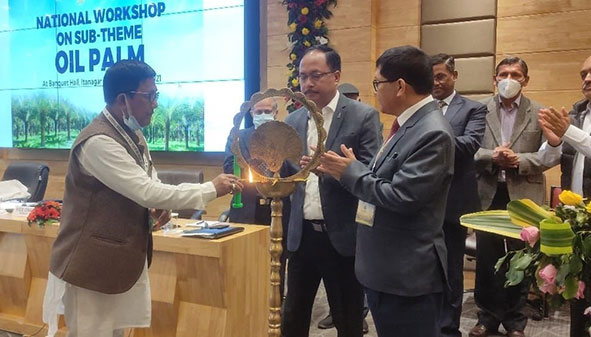[ Amar Sangno ]
ITANAGAR, 21 Dec: Representatives of various states dismissed the apprehension over the negative environmental and biodiversity impact that may be caused by oil palm cultivation.
They expressed their opinion during a national workshop on oil palm cultivation organized by the agriculture department here on Tuesday.
The department organized the workshop in a bid to give the final push to the implementation of the multi-crore oil palm plantation project in the Northeast region. The Centre has announced the Rs 11,000-crore project to boost oil palm plantation in the Northeast and the Andaman & Nicobar Islands.
Arunachal Pradesh has been identified as the state with the highest potential among the NE states in terms of having favourable areas for oil palm plantation.
Speaking at the event, Agriculture & Horticulture Minister Tage Taki dismissed the scientific reports on oil palm cultivation causing adverse environmental impact.
“The scientific reports on oil palm plantation causing environmental impact are a hoax and negative propaganda. Oil palm plantation never causes environmental impact,” he claimed.
Taki suggested that “oil palm trees should be planted extensively in the Brahmaputra river basins for flood control, considering oil palm’s strong roots.”
Negative campaign and propaganda against oil palm cultivation will continue but should not deter the implementation of the project, he said.
“Arguments, objections and negative propaganda will continue; however, we should continue the developments,” he said.
Taki also highlighted the “two major issues of agricultural and horticultural projects’ implementation, such as barbed wire fencing provision and approach road fund provision in any agricultural and horticultural projects.”
The minister informed that “Arunachal has the largest potential areas, 1.33 lakh hectares, for oil palm plantation.”
“The identified potential districts are Changlang (including Kanubari in Longding district), Namsai, Lohit, Lower Dibang Valley, East Siang, Lower Siang, the lower part of Kamle, Papum Pare, Pakke-Kessang and West Kameng districts,” he said.
Advisor to the minister, Gabriel D Wangsu dwelt on the farmers’ concerns over oil palm cultivation, and said that “the farmers’ interests need to be protected.”
He asked the representatives to “deliberate on oil palm cultivation, keeping in mind the Pakke Declaration, though the state has suitable agro-climate for oil palm cultivation.”
Stating that Arunachal is blessed with good quality soil and climate for agro plants, Chief Secretary Naresh Kumar urged the resource persons to disseminate knowledge among the farmers about climatic conditions, suitable soil, good quality saplings, manure, inter-cropping, etc, for oil palm cultivation.
Agriculture Secretary Bidol Tayeng said that “India imports huge edible oil every year,” and expressed hope that extensive discussions would be held on “formulating an effective oil palm policy and processing companies, etc.”
Indian Council of Agricultural Research DDG (Horticulture) AK Singh claimed that the reports about the negative impact of oil palm cultivation on the ecology and biodiversity “are not based on scientific report.”
It is reported that the expansion target area proposed by the government of India for the next five years in Arunachal for oil palm cultivation is 40,000 hectares.
The workshop was attended by representatives of various states, the Indian Council of Agricultural Research, central universities, processing centres, etc. (With input from DIPR)




